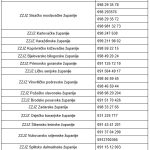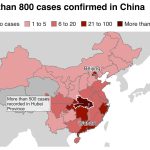March the 24th, 2020 – Despite the endless articles about coronavirus in Croatia as the situation begins to escalate and the country introduces more strict measures, many are still being left somewhat confused by statements that have been a little vague in some cases.
Let’s take a look at the measures now in force in Croatia in an attempt to stop the spread of COVID-19.
Entering Croatia:
You must be able to demonstrate that you have an address and legal residence in Croatia in order to enter.
Social distancing:
Social distancing has been required for a while now. While initially fairly liberal in its nature, it asks that people don’t gather in groups of more than five, and that a distance of one metre or more is kept between each person. Since people failed to respect this request initially, stricter measures are now in force. Unless you are going home, to the shop, to the pharmacy, or to and from work if there is no way for you to work from home (this applies mainly to key workers and those in healthcare), you should remain indoors.
Hanging around, gathering or staying out on the street is prohibited and the police can fine you for doing so.
How should I behave in pharmacies?
At the entrance to pharmacies, new measures are in place to avoid any crowding.
One staff member will serve one person and there will be no lines and waiting. After that person is dealt with, then another person can enter the pharmacy. It is an absolute must that you keep a distance of at least one metre between each other when waiting to enter the pharmacy.
It is mandatory to keep a distance of at least 1.5 metres between you and the staff member when speaking to them.
When buying disinfectants, masks and medicines, keep in mind that sales are limited and try to avoid selfishly purchasing more than you need.
Use a card payment method, preferably. Money is dirty at the best of times.
If you cough and sneeze, make sure to cover your mouth and nose and if possible, do so with a piece of tissue paper, which you then discard into a waste bin with a lid outside the pharmacy and wash your hands.
When coughing and sneezing, turn your face away from other people.
If you have respiratory issues (such as coughing, sneezing, a sore throat, a fever, or shortness of breath) please do not go to the pharmacy yourself. Instead, call your doctor or call 112.
How should I behave in stores?
All stores and their manufacturers have enough goods in stock and you won’t run out of what you need, so please don’t go into a panic buying frenzy and forget about the needs of other people. Empty shelves in stores are mainly a result of the fact that it’s impossible to fill them fast enough, and not because products are lacking in actual supply. This happens in cases where a large number of customers are looking for the same product and there is no big conspiracy behind it. Give the staff a chance.
When shopping, you need to keep a sufficient distance between yourself and other customers, especially when paying. Try to avoid going to the store in times when there are typically more people wanting to shop.
Wash your hands thoroughly before going and especially after leaving the store. Washing your hands regularly is the most important protection for you and others against COVID-19.
Thoroughly wash the fruits and vegetables you’ve purchased and are going to directly consume.
Try your best to not touch your mouth, eyes or nose while shopping and avoid contact with other customers.
If you are over 65 years od age, do not go to the store yourself. Ask your neighbours, relatives, friends or acquaintances to do your shopping for you.
Try to forget all about cash for the time being and pretend it doesn’t exist. Instead, get into the habit of making card payments. Don’t hand your debit or credit cards over to the merchants but lean them on the POS devices yourself. If you need to sign, bring your own ballpoint pen and don’t rely on the ones the shop has. Something as simple as that can help to prevent coronavirus’ potential spread.
Don’t get into panic mode. The supply in stores is currently functioning normally, even in countries where the number of infected people is extremely high. Don’t let panic overwhelm you and push you into selfishly endangering your own health or that of other people.
What is open and what is closed? What’s the current regime?
According to Slobodna Dalmacija, grocery stores have adjusted their working hours since the introduction of new measures and now operate from 08:00 to 17:00. This includes those selling hygienic supplies.
Pharmacies are open until 17:00.
Markets are no longer in operation at all.
Fuel stations operate on a regular basis.
Stores which don’t sell food and medicine are currently closed complerely, but many do still deliver, so make sure to check on their respective websites.
Pubs, cafes, bars and fast food restaurants and establishments are no longer open, but an increasing number of restaurants and other establishments are still delivering as normal. It is important that food providers, as well as those who prepare these foods, follow strict hygiene instructions so as to limit the possible spread of coronavirus as much as possible. Persons doing deliveries should also have disinfectant sprays with them.
Veterinary clinics/animal hospitals and pharmacies are working normall. However, it is advised that you don’t take your pet to the vet unless it is an emergency and the animal needs medical attention.
Dentists working in private practices have notified their patients that they’re no longer working, while others have introduced emergency services for those who require urgent treatment. All patients who have a scheduled appointment will be notified of the delay and be given instructions on what to do/who to contact should they need care.
Measures for transport and travel:
Public transport is no longer operational and will remain so for the foreseen duration of these stricter measures (currently thirty days, but this can be shortened or extended). At the moment, taxi services are running normally.
As of yesterday, a ban on leaving your city/town/municipality of registered permanent residence has been in force. This means that you cannot leave the place in which your permanent residence is registered for the time being. Click here for more details and a full translation of the official decision.
How are the police overseeing this?
The police are present on the streets and will ask people to move on if they are hanging around or are in groups. There are also large fines.
Since the decision adopted yesterday stating that people can no longer leave their place of registered permanent residence, police officers will monitor its implementation and make sure it is carried out correctly.
The police confirmed to Slobodna Dalmacija that their staff would be located on frequently roads and at the entrances to the City of Split. Only emergency service vehicles will be allowed to pass through without issue.
”In order to prevent the spread of coronavirus together, daily migrations must be kept to a minimum, which means consistent adherence to the decision, which makes it the responsibility of citizens to respect the ban, and to only leave their place of permanent residence exclusively if they have a pass/permit that was issued to them by the competent authority,” said the police.
Citizens who are excluded from the prohibition in question are required to show to police officers supervising the implementation of the decision a certificate/pass/permit issued by the competent authority.
What are these passes/permits, how do I get one?
The Civil Protection Headquarters issued the decision mentioned above. It prohibits any unnecessary long-distance movement, while for other movements, it’s necessary to perform the appropriate procedure in the form of obtaining a pass.
Details on who can be granted a pass are listed in our full translation of the decision and the measures it implies.
Persons requiring urgent medical care will be issued a pass by an elected family physician (GP), those who provide care for children and the elderly will be issued a pass by the competent civil protection staff, while all other passes are issued by, for example, an employer.
The Government published instructions for carers and e-mail addresses to which citizens should send their requests, depending on the county in which they’re located. If you need to go to the headquarters in person, you need to employ all of the other measures now in place, such as social distancing.
The request must include a detailed explanation of the needs of the person or persons you are caring for. The e-mail addresses of the competent Civil Protection Headquarters by county are listed below.
Make sure to follow our dedicated section for all you need to know about coronavirus in Croatia.










